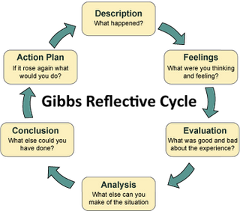Reflective tools enable reflection and concentration on many things: our relationships, our careers, a specific situation and our decisions, to name a few.
In current times, we need to take time to properly reflect. The world and our careers are changing so fast and can often feel stressful, it is even more important at the moment to take this time to reflect and learn from the change we are experiencing so that we can build resilience and move forward with confidence.
What is reflective practice?
Reflective practice is something that encourages us to take time to focus on a situation, concentrating on our feelings and analysing the experience by identifying what was good/bad about it and what we can do differently if it were to happen again. It is usually written down or spoken about, something we can refer back to and recognise patterns of change and development; it usually becomes habitual.
Reflective practice is creating a space to allow us to learn from our experiences, and think about what did happen, and what we could or should do differently in the future. Building up this store of information and experience within us, builds confidence and resilience in facing future challenges
As described by CIPD, reflective practice is
“foundation of professional development; it makes meaning from experience and
transforms insights into practical strategies for personal growth and organisational impact.”
It is:
- Learning to pay attention – listening to ourselves
- Coming face to face with our assumptions
- Noticing patterns
- Changing what we see
- Changing the way we see
- Learning from our experiences.
A model we often use in psychological practice but is regularly used in a variety of workplaces with a range of individuals, is Gibbs’ Reflective Model (1988).

The aim of the cycle is to take time to work through each stage. They are all equally important in helping us grow and develop, allowing us to get to know ourselves more, how we deal with situations, emotions and challenges. It can help us develop coping strategies for similar situations in the future. It is especially useful to complete this reflective practice during current times, focusing on certain challenges, how you reacted to them emotionally and what you did to overcome them. The main focus here is to plan for the future, analysing our emotional reactions and decision-making processes can act as a basis for using these and building on these in the future to encourage personal and professional development.
Whilst this is a useful tool to use in the workplace, as an employee, a supervisor, a manager etc., it is also a handy tool for everyday experiences as well as for students, to note down our feelings, things that happen that affect us emotionally, or challenges we encounter on a day-to-day basis.
Gibbs proposes a six-step approach which is as follows.
- Description – what happened? Concise, factual account of the situation and how it is important in the context of personal/professional development.
- Feelings – what was I thinking and feeling? What were my emotional reactions – before, during and after?
- Evaluation – what was good and bad about the situation? Reflection at a later date is also encouraged. What made me feel positive/negative about the situation?
- Analysis – Why was the experience positive/negative? Did others in the situation have the same views or reactions to you? If not, why? What else can I make of the situation? Were there any overarching issues that need to be further explored?
- Conclusion – what else could I have done? Are there any specific skills that I developed or that need improvement? Or any new knowledge/training that needs to be identified?
- Action Plan – if it were to rise again, what would I do? What resources might I need for the next steps to be taken? How can I develop in a personal/professional sense?
By completing this approach regularly, you can learn to adapt and grow from your experiences and the way you react to them. Being reflective can give you a wider range of skills, can increase resilience, can develop your confidence and ability to solve problems by questioning and changing your decisions and practices, you will find new solutions and become more flexible. This activity allows you to take time to assess your actions and appreciate them.
Other benefits of reflective practice include encouraging responsibility and accountability by making this a habit and regular exercise. It also benefits everyone involved in these experiences, whether that be colleagues or family members, by your learning to adapt to change and appreciating the positives of an experience.
Reflective writing is something that has been done for many years, but we encourage you to try this out, especially if you are currently feeling overwhelmed or stressed. It will allow you to put your feelings down on paper (or on screen!) and reflect on why you feel like that, what made you feel these things and how you can use these feelings to grow and become more resilient.
Here is a template you can use for your reflective practice
If reflective thinking and writing is something you would like some guidance with, or after completing some reflective thinking you have identified that you need some direction in your career, contact Clare at clare@cmcbp.co.uk or on +447594946166.








